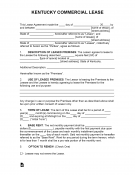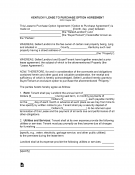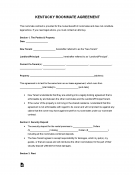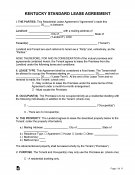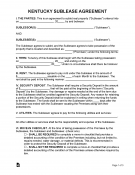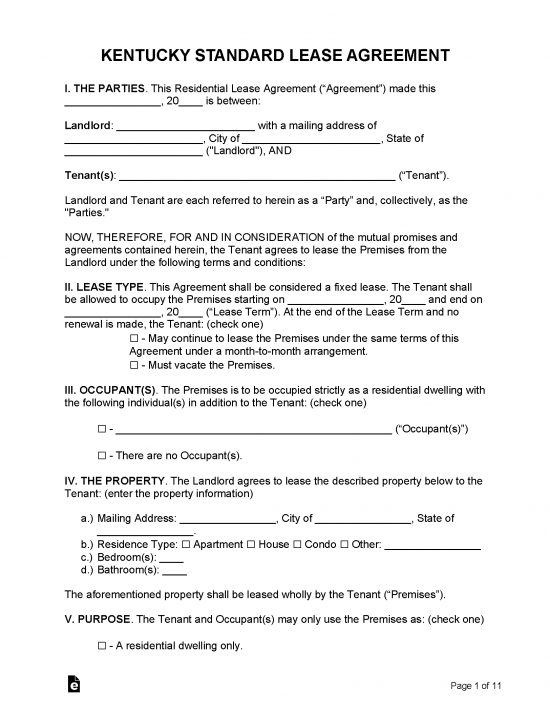Kentucky lease agreements are forms that contain the terms of a tenancy. The lease agreement is a binding contract that will set out the rent and the duties of the landlord and the tenant, as well as other terms that the parties want or that the particular property necessitates. Lease agreements can be a valuable tool to avoid disputes and litigation because they make clear to both parties what the expectations of the tenancy are.
Contents
- Kentucky Lease Agreements: By Type (6)
- Landlord-Tenant Laws
- Handbooks and Guides
By Type (6)
- Commercial Lease Agreement
- Month-to-Month Lease Agreement
- Rent-to-Own Lease Agreement
- Roommate Lease Agreement
- Standard Lease Agreement
- Sublease Agreement
Download: Adobe PDF, MS Word, Rich Text Format
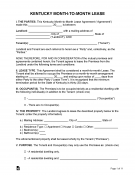 Month-to-Month Lease Agreement
Month-to-Month Lease Agreement
Download: Adobe PDF, MS Word, Rich Text Format
Download: Adobe PDF, MS Word, Rich Text Format
Download: Adobe PDF, MS Word, Rich Text Format
Download: Adobe PDF, MS Word, Rich Text Format
Download: Adobe PDF, MS Word, Rich Text Format
Landlord-Tenant Laws
Statutes – Chapter 383 (Landlord and Tenant)
Required Disclosures (4)
Authorized Access – A landlord must identify in the lease agreement the agents that are authorized to receive complaints and enter the property to perform repairs (§ 383.585).
Lead-Based Paint Disclosure – Federal law requires a landlord to notify the tenant of the risks associated with lead-based if the dwelling unit being rented was erected before 1978.
Move-in Inspection Form – If the landlord accepts a security deposit, then the landlord must enable the tenant to document existing damage on the property with this form (§ 383.580(2)).
Security Deposit Receipt – The landlord must disclose the name and account information for the institution where the security deposit, if sought, is being held (§ 383.580(1)).
Security Deposit Laws
Maximum Amount ($)
Kentucky law does not limit the amount a landlord may charge as a security deposit.
Returning to Tenant
At the conclusion of the lease, the landlord shall conduct an inspection of the property to see what damage if any beyond wear-and-tear the property has suffered during the tenancy, and use the inspection to come up with an estimate of repair costs. After the estimate is provided, the tenant may conduct an inspection as well. If the tenant disputes the landlord’s accounting, the tenant may bring an action in District Court. The landlord must mail any funds left over to the tenant’s last known address. If unable to reach the tenant and there is no contact with the tenant for at least sixty (60) days after the end of the lease, the landlord may retain all of the security deposit (§ 383.580).
When is Rent Due? (grace period)
The landlord and tenant should decide on a date and place at which rent is due in the lease agreement. Kentucky law does not require a grace period.
Eviction Notice (non-payment)
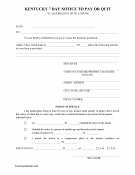 7-Day Notice to Pay or Quit – If a tenant does not provide the amount of rent owed on the appointed day, a landlord may post this notice on the property, informing the tenant that if all owed rent is not paid within seven days, the landlord may terminate the lease (§ 383.660).
7-Day Notice to Pay or Quit – If a tenant does not provide the amount of rent owed on the appointed day, a landlord may post this notice on the property, informing the tenant that if all owed rent is not paid within seven days, the landlord may terminate the lease (§ 383.660).
Download: Adobe PDF
Maximum Fees ($)
Late Rent Penalties
Kentucky law does not set a maximum late fee that a landlord may impose. However, landlords should identify the fee, if any, in the lease agreement, and the fee must be reasonable.
NSF Checks
Kentucky law does not specify a maximum fee that may be charged for providing a rent check with insufficient funds. However, as with late fees, any fee should be identified in the lease agreement and be reasonable.
Tenant’s Unclaimed Property
Kentucky law contains no provision for how a landlord should handle a tenant’s personal property left in the landlord’s unit. However, based on guidance from other states, best practice is for a landlord to remove the property, store it for at least two (2) weeks, and attempt to contact the tenant about the property. Landlords can generally charge the cost of storing the property to the tenant, and if the tenant fails to collect the personal property, the landlord can generally sell the property and collect the proceeds.
